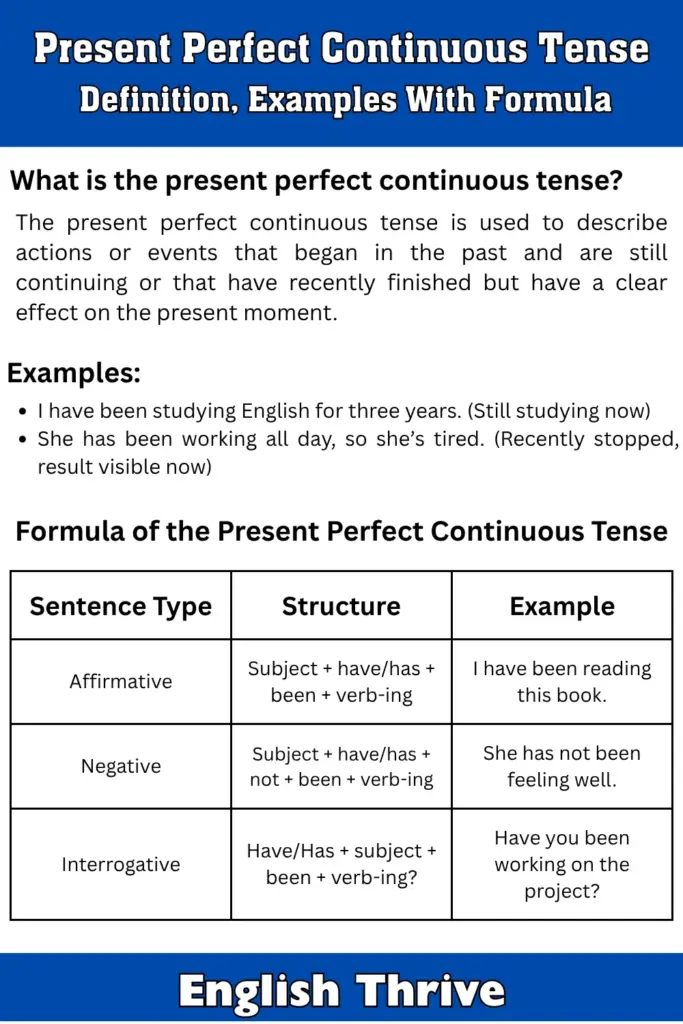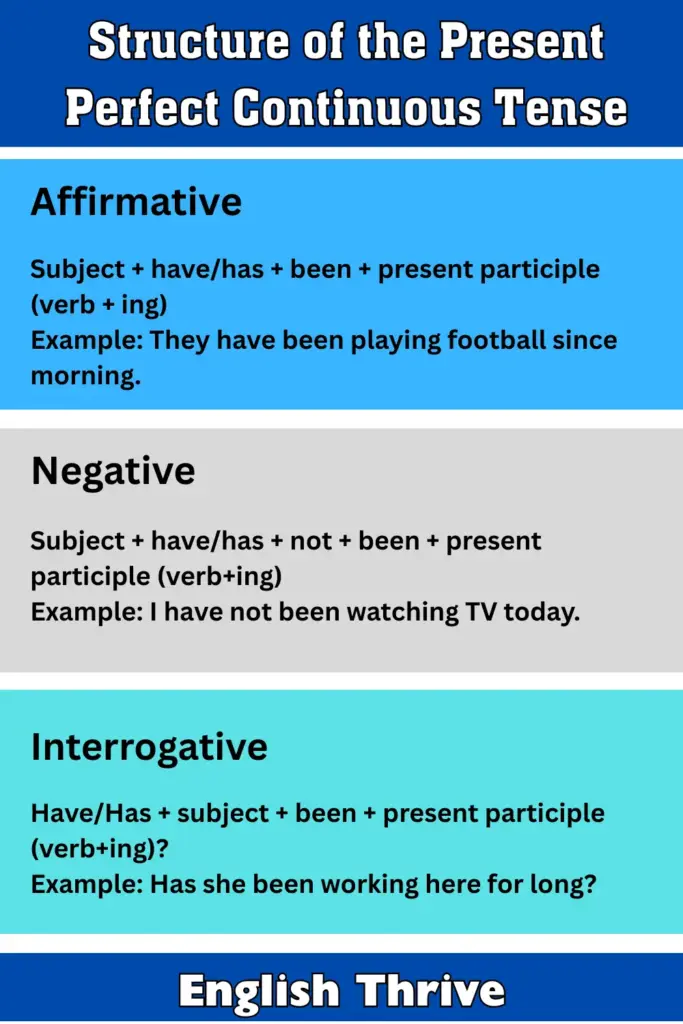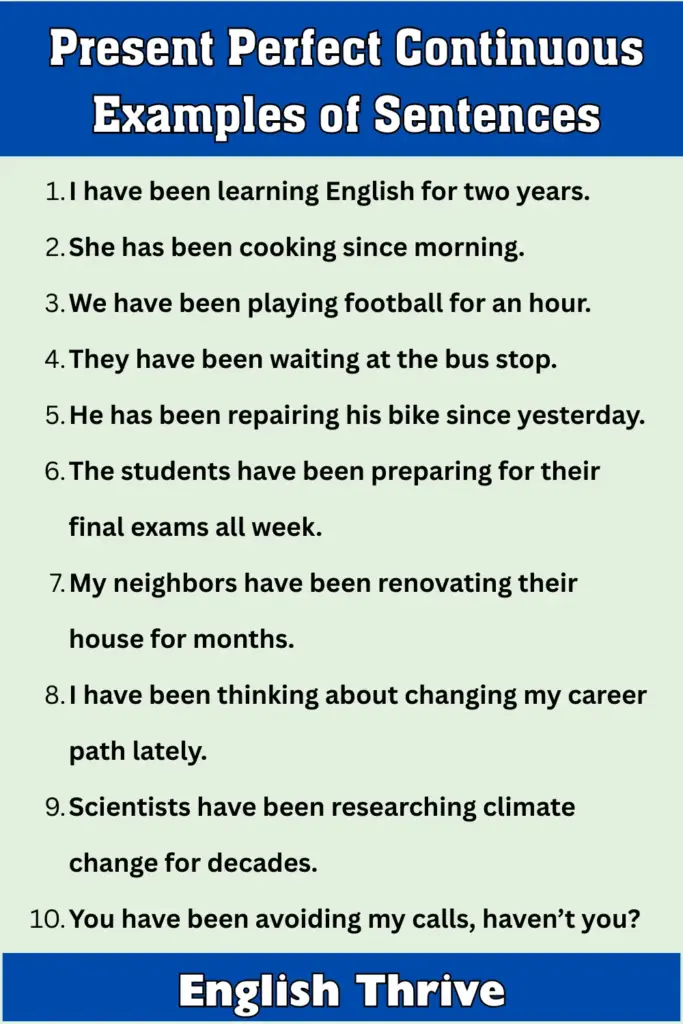The present perfect continuous tense is one of the most expressive English tenses, used to describe actions that began in the past and continue to the present or that have recently stopped but are still having an effect. In this guide, you will learn its definition, structure, usage rules, time expressions and see real-life examples that make it easy to read and understand. If you are an English student or teacher, this tense lesson will help you speak and write more naturally.
Contents
ToggleWhat is the present perfect continuous tense?
Definition:
The present perfect continuous tense is used to describe actions or events that began in the past and are still continuing or that have recently finished but have a clear effect on the present moment.
Examples:
- I have been studying English for three years. (Still studying now)
- She has been working all day, so she’s tired. (Recently stopped, result visible now)
Formula of the Present Perfect Continuous Tense
| Sentence Type | Structure | Example |
|---|---|---|
| Affirmative | Subject + have/has + been + verb-ing | I have been reading this book. |
| Negative | Subject + have/has + not + been + verb-ing | She has not been feeling well. |
| Interrogative | Have/Has + subject + been + verb-ing? | Have you been working on the project? |
Quick Tip:
- Use have for I, you, we, they.
- Use has for he, she, it.

Structure of the Present Perfect Continuous Tense
Affirmative
- Subject + have/has + been + present participle (verb + ing)
Example: They have been playing football since morning.
Negative
- Subject + have/has + not + been + present participle (verb+ing)
Example: I have not been watching TV today.
Interrogative
- Have/Has + subject + been + present participle (verb+ing)?
Example: Has she been working here for long?

When to Use the Present Perfect Continuous Tense
1. Actions That Started in the Past and Continue in the Present
We use this tense to talk about actions that began earlier and are still happening now.
Examples:
- I have been learning English for two years. (Still learning now)
- We have been living in this city since 2015.
Common Time Expressions:
- for two hours, for three weeks, for a long time
- since 9 a.m., since Monday, since last year
2. Actions That Recently Stopped but Have Present Effects
We also use the present perfect continuous to talk about actions that have just finished but still affect the present moment.
Examples:
- She’s tired because she has been running.
- The ground is wet because it has been raining.
- I’m happy because I have been talking to my best friend.
3. Repeated Actions and Habits
This tense can also describe actions that happen again and again over a period of time.
Examples:
- We have been visiting our grandparents every weekend.
- He has been calling me a lot lately.
4. Time Expressions with “For” and “Since”
We often use for and since with the present perfect continuous to show duration.
| Expression | Usage | Example |
|---|---|---|
| For | Shows a period of time | I have been studying for three hours. |
| Since | Shows the starting point of an action | She has been working here since 2018. |
Common Time Markers:
- for ages, for years, for months, for hours
- since Monday, since last summer, since childhood
5. Present Perfect Continuous vs. Present Perfect
Although similar, these tenses are not always interchangeable. The table below shows the difference:
| Aspect | Present Perfect Continuous | Present Perfect |
|---|---|---|
| Focus | Emphasizes duration of the activity | Focuses on the result or completion |
| Form | have/has + been + verb-ing | have/has + past participle |
| Example (Ongoing) | I have been reading this book for two hours. | I have read 50 pages of this book. |
| Example (Recently Finished) | She’s tired because she has been running. | She has run 10 kilometers today. |
| With Stative Verbs | ❌ Not usually used | ✅ Commonly used – “I have known her for years.” |
6. Avoiding Common Mistakes
Many learners make errors with this tense. Here are the main points to remember:
| Mistake | Why It’s Wrong | Correct Form |
|---|---|---|
| I have been know her for years. | Stative verbs don’t use continuous form. | I have known her for years. |
| He has been work here since 2020. | Missing “-ing” in main verb. | He has been working here since 2020. |
| We have been lived here for a long time. | Wrong verb form after “been”. | We have been living here for a long time. |
7. Present Perfect Continuous vs. Present Continuous
These two tenses can both describe ongoing actions, but they are used differently.
| Aspect | Present Perfect Continuous | Present Continuous |
|---|---|---|
| Focus | Links past and present; action began earlier and continues now or has just stopped | Focuses on the action happening right now |
| Form | have/has + been + verb-ing | am/is/are + verb-ing |
| Example (Ongoing) | I have been studying since 8 a.m. (It started earlier and is still happening) | I am studying right now (focus only on the present moment) |
| Example (Recently Finished) | She is tired because she has been running. | ❌ Cannot be used for recently finished actions |
8. Examples of Present Perfect Continuous Sentences
- I have been learning English for two years.
- She has been cooking since morning.
- We have been playing football for an hour.
- They have been waiting at the bus stop.
- He has been repairing his bike since yesterday.
- The students have been preparing for their final exams all week.
- My neighbors have been renovating their house for months.
- I have been thinking about changing my career path lately.
- Scientists have been researching climate change for decades.
- You have been avoiding my calls, haven’t you?

9. Present Perfect Continuous Tense – Practice Worksheet
Part A – Fill in the Blanks
Complete each sentence using the correct form of the present perfect continuous tense.
- She ________ (work) on her project for three hours.
- We ________ (not / sleep) well lately.
- ________ you ________ (wait) long?
- He ________ (study) English since he moved to Canada.
- I ________ (watch) this TV series since last week.
Part B – Correct the Mistakes
Find and correct the mistakes in the following sentences.
- I have been know her for years.
- They has been playing tennis for hours.
- He have been do his homework since morning.
- We has been live here since 2012.
- She have been cooking since two hours.
Part C – Match the Sentences with the Time Expressions
Match each sentence to the most suitable time expression: for two hours, since Monday, for a long time, since 2015, lately
a. They have been learning Spanish.
b. I have been feeling tired.
c. She has been playing the piano.
d. We have been waiting here.
e. He has been working at the company..
Answer Key (self-check)
Part A
- has been working
- haven’t been sleeping
- Have / been waiting
- has been studying
- have been watching
Part B
- I have known her for years.
- They have been playing tennis for hours.
- He has been doing his homework since morning.
- We have been living here since 2012.
- She has been cooking for two hours.
Part C
a – for a long time
b – lately
c – since Monday
d – for two hours
e – since 2015
10. FAQs about Present Perfect Continuous Tense
Q1: What is the difference between present perfect and present perfect continuous?
The present perfect focuses on the result or completion, while the present perfect continuous focuses on the duration or ongoing nature of the activity.
Q2: Can we use stative verbs in the present perfect continuous tense?
Generally, no. Stative verbs (e.g., know, like, believe) are not used in continuous forms. Use the present perfect tense instead.
Q3: What are common time expressions for this tense?
for, since, lately, recently, all day, all week.
Conclusion
The present perfect continuous tense is essential for expressing actions that connect the past with the present, especially when you want to emphasize how long something has been happening. By learning its structure, rules, and common time expressions, you can make your English speech more natural and fluent

